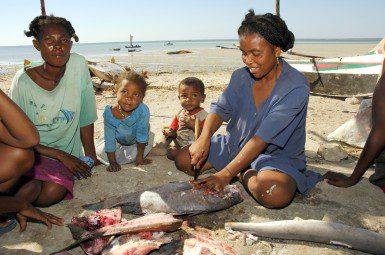By Kame Westerman, Velondriake MPA Project Coordinator, Madagascar
According to the United Nations, world population will reach 7 billion at the end of this month. The majority of this growth is in developing countries, where communities are highly reliant on a finite supply of natural resources and primarily rely on agriculture or fishing for daily income generation and food. Imagine for a moment what this number actually means.
More people mean an increase in food and water consumption, more housing material needs, more firewood required, and an increase in resource harvest to generate income. Another sobering thought is that many of these countries are, at the same time, experiencing declining agricultural production (particularly in sub-Saharan Africa) and fisheries that are only predicted to worsen over the next few decades. And then there’s climate change, which will further reduce the productivity of both terrestrial and marine ecosystems.
These are all issues that Blue Ventures’ integrated programs are addressing in fishing villages along coastal west and southwest Madagascar. These communities are a prime example of this precarious blend – rapidly growing communities, dwindling marine resources, pervasive poverty, and disruptive climate impacts.
As the population clock ticks over to 7 billion at the end of this month, Blue Ventures will be participating in the Western Indian Ocean Marine Science Association symposium held in Kenya, discussing Blue Ventures’ integrated approach with marine conservationists from around the region about these pressing issues. With four presentations, 14 posters, and two side events, BV is sure to be a major presence during the symposium and aims to guide policy and practice in vulnerable communities through the western Indian Ocean region.


